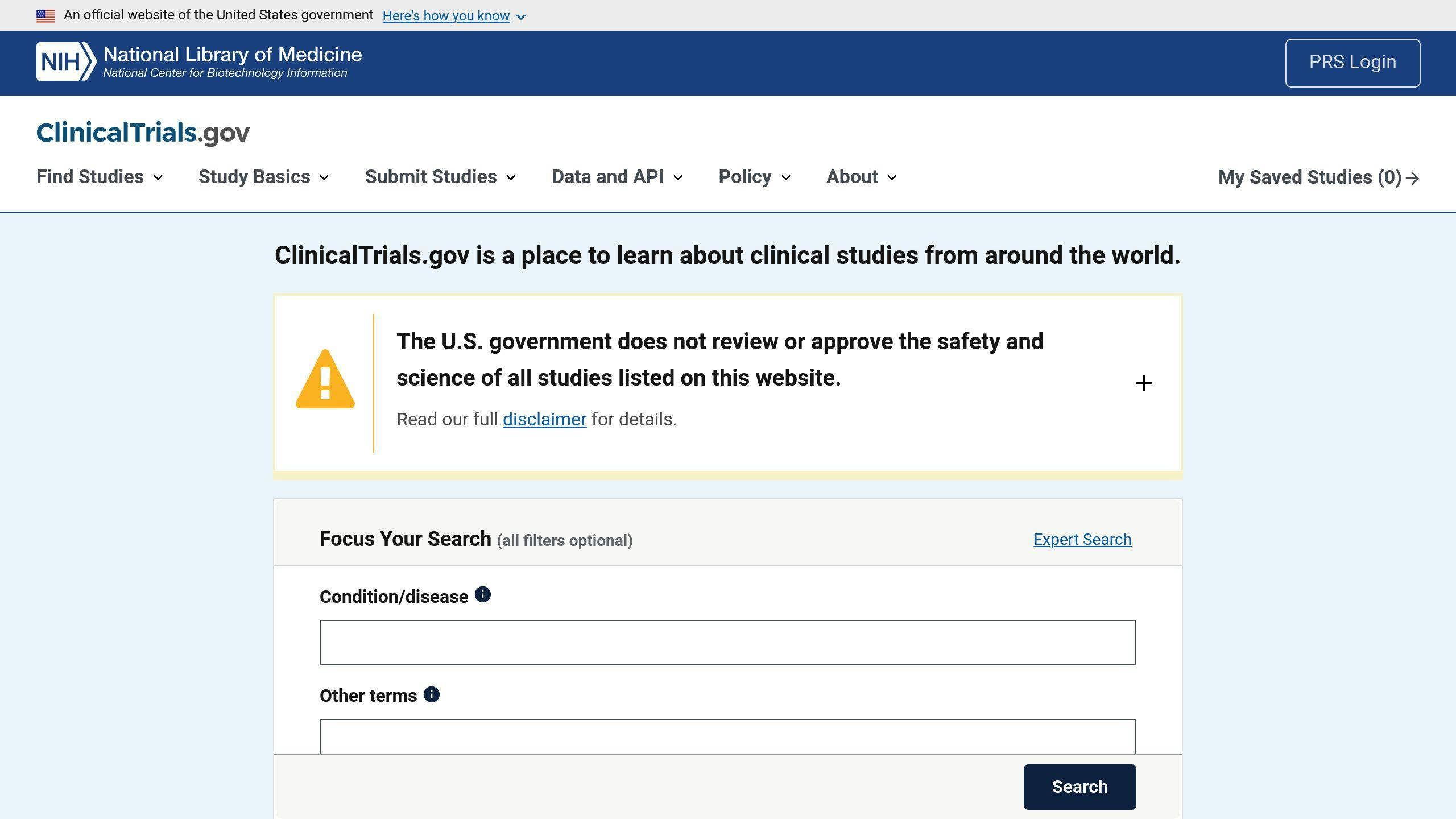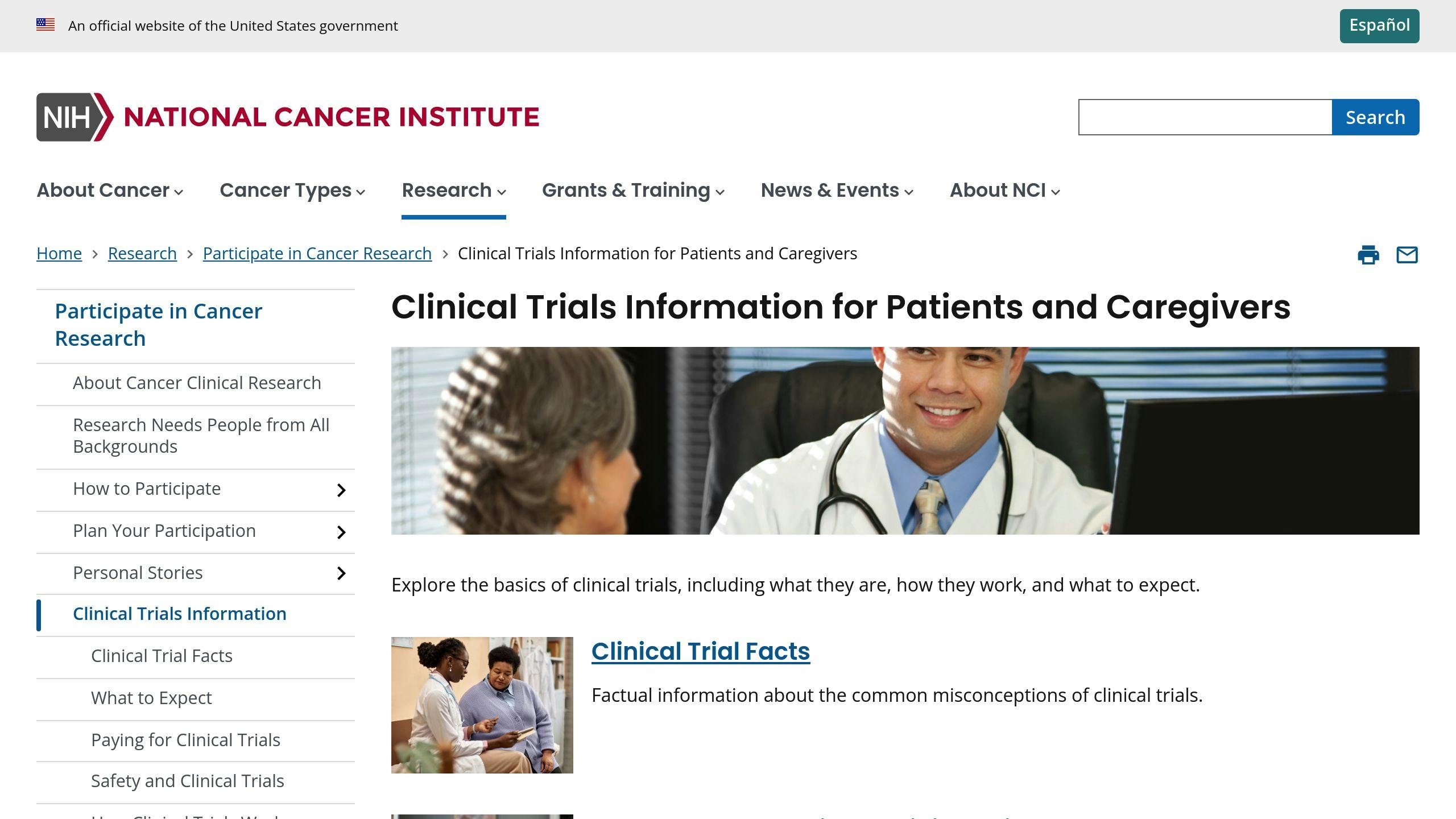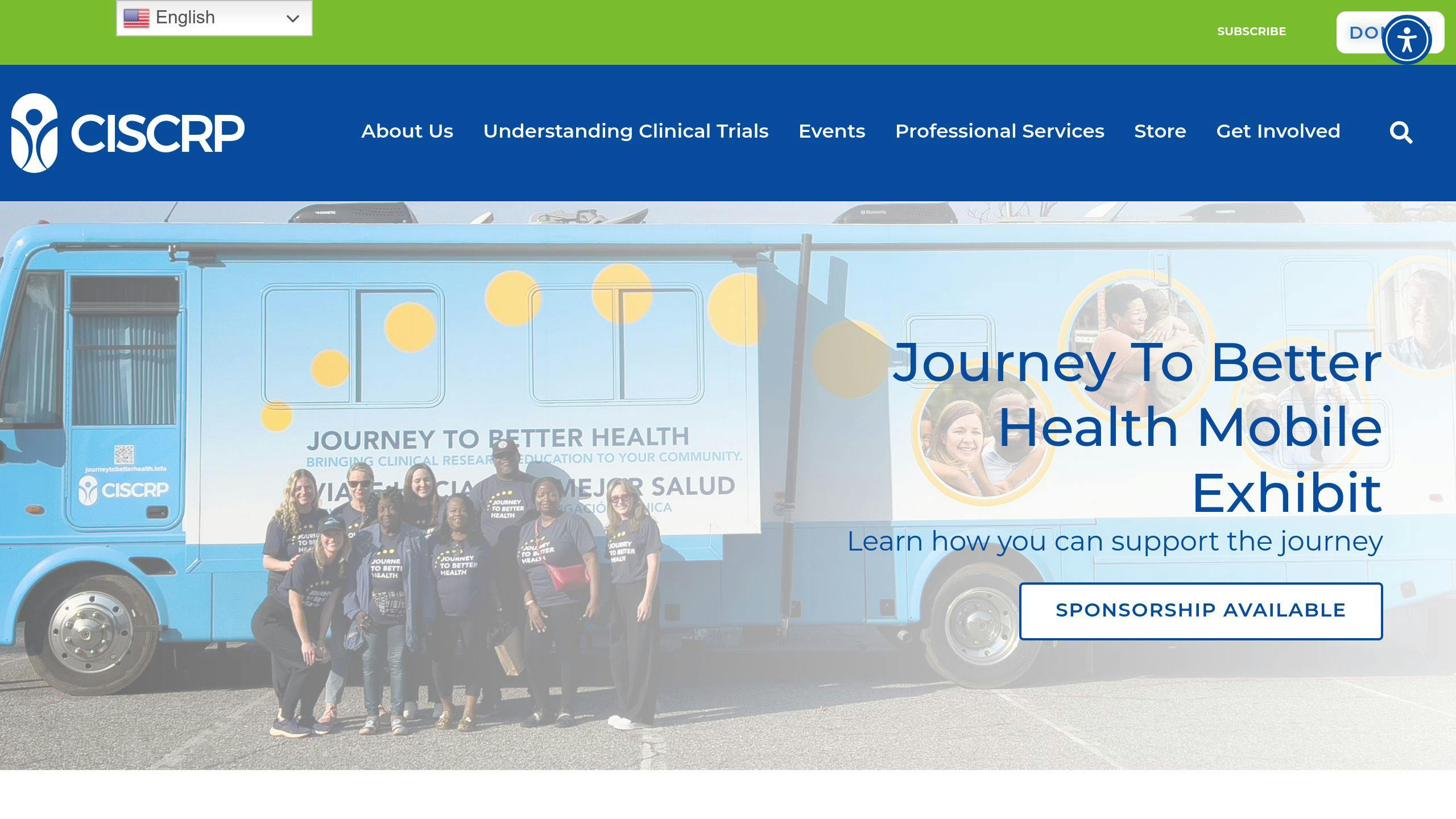5 Ways to Find Clinical Trials for Your Cancer Type
Finding a clinical trial for your cancer type can feel overwhelming, but it doesn't have to be. Here's a quick guide to help you get started:
- Understand Eligibility: Gather your medical records, including cancer type, stage, biomarkers, and treatment history. Check trial requirements like health status and previous treatments.
- Search Online Databases: Use tools like ClinicalTrials.gov, the NCI Clinical Trials Search, or CISCRP to browse trials.
- Work with Advocacy Groups: Groups like the American Cancer Society or the Alliance for Clinical Trials in Oncology offer personalized guidance and support.
- Contact Hospitals and Oncology Centers: Reach out to NCI-Designated Cancer Centers or your local hospital to explore trial options.
- Use Personalized Matching Services: Services like Cancer Clinical Trial Experts can match you with trials tailored to your case.
These steps can connect you with advanced treatment options and provide hope for better outcomes. Start by organizing your medical records and exploring these resources.
How to Find a Clinical Trial for Cancer Treatment
1. Understanding Clinical Trials and Eligibility
Grasping eligibility is an essential first step when searching for a clinical trial. Without this knowledge, it can be tough to find a trial that fits your specific diagnosis and treatment history.
Gather Details About Your Cancer
To search effectively, you'll need detailed medical records. Here's what to pull together:
| Key Information | What to Include |
|---|---|
| Cancer Details and Biomarkers | - Type and subtype - Stage and grade - Location of cancer - Date of diagnosis - Genetic mutations - Hormone receptor status - Other molecular markers |
| Treatment History | - Past therapies - Current medications - Response to treatments - Side effects experienced |
| Medical Records | - Pathology reports - Imaging studies - Lab test results Keep these documents organized for quick access. |
Learn About Eligibility Criteria
Eligibility criteria often focus on two areas:
General Health and Daily Functioning:
- Age, overall health, and ability to handle daily tasks
- Your capacity to travel to trial locations
Cancer-Specific Factors:
- Type and stage of cancer
- Previous treatments you've undergone
- Specific biomarkers present
- Time elapsed since your last treatment
If you're unsure about the eligibility terms, reach out to the NCI's Cancer Information Service. They offer free support to help clarify technical details and explain how criteria apply to you [3].
Once you have your medical records and understand the eligibility requirements, you're ready to dive into online resources to find trials that match your profile.
2. Searching Online Databases for Trials
Online databases are a great way to find clinical trials that fit your eligibility criteria. Here's how to navigate some of the most useful platforms.
ClinicalTrials.gov

As the largest clinical trials database, ClinicalTrials.gov is a key resource. Here's how to make the most of it:
| Feature | How to Use |
|---|---|
| Search Terms | Enter keywords like your condition, stage, or treatment name to begin your search. |
| Advanced Filters | Refine results by location, trial phase, or recruitment status. |
Start with general terms, such as "breast cancer", and then use filters to zero in on trials that meet your specific needs.
National Cancer Institute (NCI) Clinical Trials Search

The NCI's search tool is tailored for cancer patients. It provides filters specific to cancer types, easy-to-read trial summaries, and direct contact options.
Helpful Tip: You can call 1-800-4-CANCER for personalized support with your search or to get more details about trials.
CISCRP (Center for Information and Study on Clinical Research Participation)

CISCRP offers an easy-to-use search tool along with educational resources about clinical trials. For extra help, call 1-877-MED HERO.
Quick Tip: Save trials you're interested in to discuss with your doctor later. Also, double-check recruitment statuses regularly to stay up to date.
Since no single database includes every trial, it's smart to explore multiple platforms [3]. After using these tools, consider reaching out to patient advocacy groups for additional guidance.
3. Working with Patient Advocacy Groups
Patient advocacy groups provide both practical help and emotional support, guiding cancer patients through treatment decisions and clinical trial searches. They go beyond online databases by offering a more personalized, human-focused approach.
Cancer-Specific Advocacy Organizations
| Organization | Key Services |
|---|---|
| Alliance for Clinical Trials in Oncology | Helps match patients with trials, provides clear trial summaries, and supports patient engagement through an advocate committee |
| American Cancer Society | Offers cancer-specific resources and support for navigating clinical trials |
| National Cancer Institute | Provides advocacy support through its Office of Advocacy Relations and distributes educational materials |
"Involving advocates in all stages of cancer research helps patients live longer, live better, or both!" - Patty Spears, Alliance Patient Advocate Committee Chair [2]
How Patient Advocates Can Help
Patient advocates, often cancer survivors or caregivers, play a crucial role in simplifying the clinical trial process. They can explain medical jargon, share personal experiences with trials, and offer emotional support. For instance, the NCI's Office of Advocacy Relations connects patients with trained advocates who can break down trial protocols and help with enrollment [2]. These advocates bring a unique perspective, helping patients understand what to expect throughout the trial journey.
For the best support, seek out advocacy groups that focus on your specific type of cancer. These groups often have the most useful resources and connections tailored to your needs. The National Comprehensive Cancer Centers website is a great place to find an updated list of these organizations [1].
After working with advocacy groups, your next step could be reaching out to hospitals and oncology centers for more clinical trial opportunities.
4. Checking Hospitals and Oncology Centers
Hospitals and oncology centers, especially the renowned NCI-Designated Cancer Centers, are excellent resources for finding clinical trials. These institutions lead cancer research and provide access to advanced treatments and studies.
NCI-Designated Cancer Centers
NCI-Designated Cancer Centers oversee more than 6,500 active trials, offering various ways to explore clinical trial options:
| Resource Type | What They Offer | How to Access |
|---|---|---|
| Cancer Center Website | Trial database, eligibility details | Search "clinical trials" on their website |
| Research Department | Patient screening, trial coordination | Contact via phone or email |
| Patient Navigator | One-on-one guidance, trial matching | Request through the oncology department |
These centers are a hub for trial opportunities. However, reaching out directly to their oncology departments can often provide even more tailored options.
Contacting Oncology Departments
Before reaching out, ensure your medical records and treatment history are well-organized (see Section 1 for tips). When speaking with oncology departments, make sure to inquire about:
- Trial logistics, including costs and treatment protocols
- Insurance coverage details
- Available support services
Clinical trial coordinators can help connect you with studies that align with your needs, addressing both medical and practical considerations. To make the most of your search, ask for a consultation with the research team to evaluate current trials and find those that fit your specific situation [3].
If you're feeling overwhelmed or need more guidance, personalized matching services are also available to help you navigate your options.
5. Using Personalized Trial Matching Services
Personalized trial matching services take a focused approach to connecting patients with clinical trials, especially helpful when traditional search methods fall short. These services rely on expert evaluations and large trial databases to align options with your specific diagnosis and treatment needs.
Cancer Clinical Trial Experts

Cancer Clinical Trial Experts helps patients find trials through personalized consultations, expert insights, and access to exclusive databases covering more than 20 types of cancer. They review your case, identify suitable trials, and keep you informed about new opportunities as they arise.
Here’s how their process works:
| Service Component | Description |
|---|---|
| Initial Consultation | A detailed review of your medical history and current treatments. |
| Expert Analysis | Assessment by specialists experienced in various cancer types. |
| Trial Database Access | Direct connections to research institutions and pharmaceutical companies. |
| Ongoing Support | Regular updates on newly available trials. |
For the best results, have your medical records ready, as explained in Section 1. These services work alongside other tools, like online databases and advocacy groups, by offering specialized expertise and access to trials that may not be widely available.
Conclusion: Exploring Your Options
These strategies can help you find treatment options suited to your specific cancer type. The National Cancer Institute's database and network of NCI-Designated Cancer Centers are excellent starting points for your search [3].
Patient advocacy groups play a key role in bridging the gap between patients and researchers, offering guidance and support throughout your journey. Combined with other resources, they can help expand your treatment possibilities [2].
Here’s how each resource contributes to your search:
- Online Databases: Quick access to thousands of trials, complete with step-by-step search tools.
- Patient Advocacy Groups: Personalized support and trial recommendations tailored to your needs.
- Hospital Programs: Access to local trials directly through your healthcare team.
- Trial Matching Services: Expert insights to find trials that align with your medical profile.
- NCI Resources: Reliable and updated trial information with professional assistance.
Clinical trials not only provide treatment opportunities but also drive progress in cancer care. The Coalition of Patient Advocacy Groups ensures that you have support every step of the way [4].
Whether you start with ClinicalTrials.gov, consult advocacy groups, or contact an NCI-Designated Cancer Center, you’re taking an active role in your treatment journey. By leveraging these resources, you can explore new treatment possibilities with expert guidance and support [2][3].
Take the first step by gathering your medical records and connecting with these resources. Each step brings you closer to exploring advanced treatments and the hope they offer.
FAQs
Looking for quick answers about finding cancer clinical trials? Here’s a breakdown of the most common questions with clear, helpful guidance.
How to Find Clinical Trials for Cancer?
Here are some practical ways to find clinical trials that suit your needs:
-
Call the NCI Helpline: Dial 1-800-4-CANCER (1-800-422-6237) to get personalized help from cancer information specialists [1].
-
Search Official Databases:
-
Consult Healthcare Providers:
- Talk to your oncology team.
- Reach out to NCI-Designated Cancer Centers.
- Get in touch with patient advocacy groups [2].
"Patient advocates play a crucial role in cancer research by bringing the patient's perspective to clinical trials and helping identify gaps in cancer patient care" [2][4].
Quick Resource Overview:
| Resource Type | Where to Access | Best For |
|---|---|---|
| Government Database | NCI Clinical Trials Search | Detailed trial listings [3] |
| Patient Support | CISCRP | Easy-to-use search tools [1] |
| Local Opportunities | Hospital Networks | Nearby trial options |
For more tips on using these tools effectively, see Sections 2-4 of this guide. Patient advocacy groups can also help you navigate your choices and understand trial requirements [1][2].
Keywords: clinical trials, cancer research, eligibility criteria, online databases, patient advocacy, oncology centers